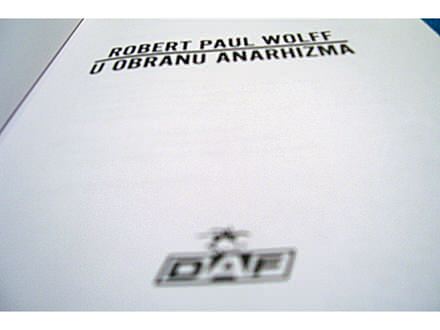U obranu anarhizma - Robert Pol Vulf
| Cena: |
| Želi ovaj predmet: | 9 |
| Stanje: | Polovan bez oštećenja |
| Garancija: | Ne |
| Isporuka: | Pošta Post Express Lično preuzimanje |
| Plaćanje: | Tekući račun (pre slanja)
Lično |
| Grad: |
Novi Sad, Novi Sad |
Godina izdanja: 2001
ISBN: 953-97670-6-7
Jezik: Srpski
Autor: Strani
U obranu anarhizma - Robert Paul Wolff
Format: 21
Broj stranica: 100
Povez: meki
Godina izdanja: 2001
Izdavač: DAF, ZAGREB
Knjiga poznatoga američkoga filozofa politike Roberta Paula Wolffa rijetko je koncizan pregled temeljne problematike anarhizma kao svjetonazora i političke teorije. Wolffov je interes usmjeren dokazivanju načelne nemogućnosti legitimnosti države kao instrumenta ovlasti jedne skupine ljudi nad drugima.
Riječ je o veoma koherentnom izlaganju jedne kritičke pozicije, gdje je Wolff s lakoćom pokazao da se moralna autonomija pojedinca nikako ne može uskladiti s autoritetom države i da se ne može naći nikakvo teoretsko opravdanje za vlast države.
„Ako je politička teorija potraga za temeljnim načelima legitimne vlasti, kako sugeriram na prvim stranicama ogleda U obranu anarhizma, onda je politička teorija mrtva. Na njezino mjesto morate staviti političku akciju, koju će voditi razum i koja će biti usmjerena prema onim kolektivnim ciljevima kojima ste vi i vaši drugovi odani. Ako nemate drugove, onda vam ni ova knjižica ni bilo što drugo ne može pomoći.“
Robert Paul Wolff, Pelham, Massachusetts, 3. veljače 1998.
(Iz predgovora za izdanje iz 1998. godine)
In Defense of Anarchism
Author Robert Paul Wolff
Original title In Defense of Anarchism : With a Reply to Jeffrey H. Reiman`s In Defense of Political Philosophy.
Subject Anarchism, political philosophy
Genre Analytic philosophy
In Defense of Anarchism is a 1970 book by Robert Paul Wolff regarded as a classical work in anarchist scholarship. Wolff specifically defends individualist anarchism; the book is premised on the idea that individual autonomy and state authority are mutually exclusive and, as individual autonomy is inalienable, the moral legitimacy of the state thus collapses.
First published by Harper and Row in 1970 as In Defense of Anarchism : With a Reply to Jeffrey H. Reiman`s In Defense of Political Philosophy., it has since run to five editions, the latest of which is the University of California Press 1998 edition. It is held in the Paul Avrich Collection in the Library of Congress.
Structure
The book is structured in three parts: `The Conflict between Authority and Autonomy,` `The Solution of Classical Democracy,` `Beyond the Legitimate State,` and an appendix, `Appendix: A proposal for Instant Direct Democracy.` The book opens with Part I, `The Conflict between Authority and Autonomy,` which Wolff begins by positing as the essence of modern political philosophy `how the moral autonomy of the individual can be made compatible with the legitimate authority of the state.` As an anarchist, he believes that it cannot be. What follows is Wolff`s account of authority and Kantian autonomy, and the incompatibility of the two.
Part II, `The Solution of Classical Democracy,` is Wolff`s account of democratic liberalism, the dominant political structure of the late 20th century. He investigates unanimous direct democracy, representative democracy, and majoritarian democracy, drawing on Rawlsian arguments for the practicality of consensus decision-making. Wolff argues that consensus is limited by the requirement that participants are generally rational and altruistic, and that the community in question is not too large.[1] He goes on to critique the notion of democratic representation, pointing out that representation is an illusion as representatives do not obey the wishes of their constituents, and that it is impossible not to distinguish between the rulers and the ruled in a representational system.
In Part III, `Beyond the Legitimate State,` Wolff arrives at the foreshadowed conclusion that because autonomy and the legitimacy of state power are incompatible, one must either embrace anarchism or surrender one`s autonomy, as Thomas Hobbes proposed, to whichever authority seems strongest at the time.[1] Democracy, in this schema, is no better than dictatorship, a priori, as both require forsaking one`s autonomy.
Reception
The book was well received not only in academic philosophy and in traditional anarchist circles, but also by individualist anarchists of the market anarchist variety such as Murray Rothbard, whose letters of praise `chagrined` Wolff, who was shocked to have a position that was consonant to those he thought of as `right wingers`.
Wolff`s premising of `the State` and the `autonomous individual` as fixed, given entities has been criticised by Thomas Martin in Social Anarchism as reflecting `basic assumptions arising from Renaissance humanism, Enlightenment liberalism, and the alliance of capitalism and central authority that has marked the industrial era.` Such notions have been critiqued by late 20th century currents in anarchist thought such as post-left anarchy, insurrectionary anarchism and particularly post-anarchism.
Predmet: 15871929











